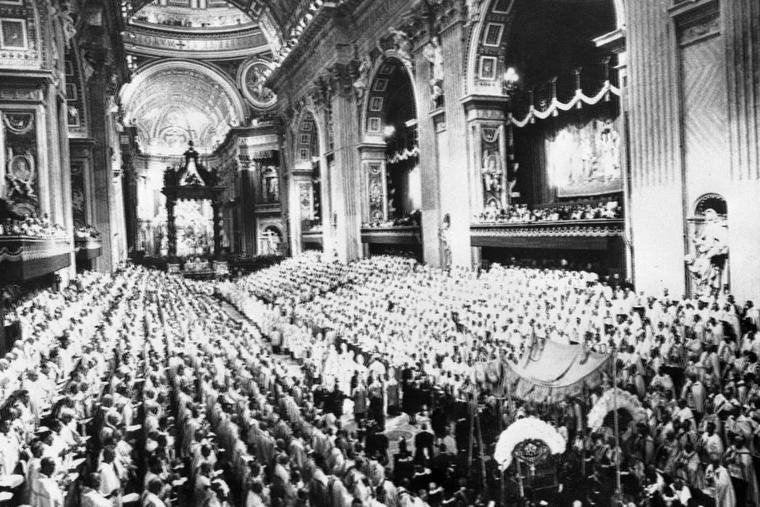- Feb 5, 2002
- 166,616
- 56,251
- Country
- United States
- Faith
- Catholic
- Marital Status
- Married
- Politics
- US-Others
COMMENTARY: A glimpse at the development of the constitution ‘Dei Verbum’ makes clear the role of Scripture and Tradition as the supreme rule of faith.
The Fathers of the Second Vatican Council finished their debate on the Sacred Liturgy on Nov. 13, 1962, at the end of the 18th general session. Despite various areas of disagreement, the assembly was generally happy with the proposed draft for a constitution on the liturgy. The next day, in a preliminary vote, the Council Fathers voted overwhelmingly to express their approval of the text.
However, such broad consensus would not last long. The next topic of discussion for the Council was a draft text on “Sources of Revelation” which would eventually result in the dogmatic constitution on divine Revelation, Dei Verbum. The proposed document sought to respond to the need, widely recognized during the preparation of the Council, for a presentation of the Catholic teaching regarding sacred Scripture.
From the preparatory phase onward, many commission members and theologians expressed their dissatisfaction with the draft on Revelation prepared by the Theological Commission. Before the text was even discussed on the Council floor, various alternatives were already circulating among the Council Fathers.
So when Cardinal Alfredo Ottaviani presented the draft to open the Council’s discussion on Nov. 14, 1962, he was already on the defensive. The Italian cardinal criticized the circulation of the alternative drafts as being contrary to canon law. He went on to address some of the criticisms that had been made against the draft: that it was not pastoral enough and that it did not incorporate more recent theology.
Continued below.

 www.ncregister.com
www.ncregister.com
The Fathers of the Second Vatican Council finished their debate on the Sacred Liturgy on Nov. 13, 1962, at the end of the 18th general session. Despite various areas of disagreement, the assembly was generally happy with the proposed draft for a constitution on the liturgy. The next day, in a preliminary vote, the Council Fathers voted overwhelmingly to express their approval of the text.
However, such broad consensus would not last long. The next topic of discussion for the Council was a draft text on “Sources of Revelation” which would eventually result in the dogmatic constitution on divine Revelation, Dei Verbum. The proposed document sought to respond to the need, widely recognized during the preparation of the Council, for a presentation of the Catholic teaching regarding sacred Scripture.
From the preparatory phase onward, many commission members and theologians expressed their dissatisfaction with the draft on Revelation prepared by the Theological Commission. Before the text was even discussed on the Council floor, various alternatives were already circulating among the Council Fathers.
So when Cardinal Alfredo Ottaviani presented the draft to open the Council’s discussion on Nov. 14, 1962, he was already on the defensive. The Italian cardinal criticized the circulation of the alternative drafts as being contrary to canon law. He went on to address some of the criticisms that had been made against the draft: that it was not pastoral enough and that it did not incorporate more recent theology.
Continued below.

The Debate on Divine Revelation Was a Pivotal Moment of Vatican II
COMMENTARY: A glimpse at the development of the constitution ‘Dei Verbum’ makes clear the role of Scripture and Tradition as the supreme rule of faith.
